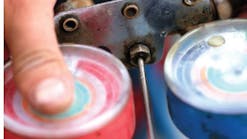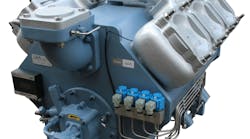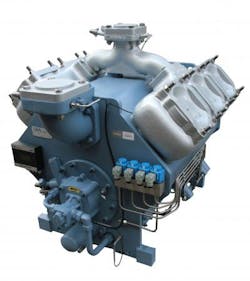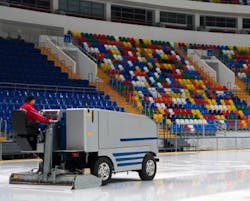Modern refrigeration processes employ a wide variety of highly-advanced techniques to remove heat from an enclosed space. These methods range from vapor compression and vapor absorption refrigeration to thermo-electric and magnetic refrigeration.
Vapor-compression cyclical refrigeration is the most widespread form of refrigeration for household and commercial refrigerators, air-conditioning installations, the food processing industry, refrigerated trucks and other large industrial refrigeration systems. With this particular refrigeration technique, the liquid refrigerant evaporates by absorbing the heat contained in the space to be cooled down, therefore lowering its temperature. Later in the circuit, the gaseous refrigerant is compressed and condensed again into a liquid state, releasing the heat.
The Vapor-compression Refrigeration Cycle
The vapor-compression refrigeration system consists of four main components: a compressor, a condenser, an expansion valve, and an evaporator. Different compressor types can be used in refrigeration systems depending on the particular application as well as on size, noise, efficiency and pressure issues. The most commonly used refrigeration compressors are reciprocating and rotary screw compressors. As with any mechanical device, compressors are subjected to noise and vibration issues which might compromise the manufacturer’s quality standards and customer satisfaction.
When vibro-acoustic problems occur, it is crucial to determine the acoustic hotspots and detect structural resonances.
Extensive experimental testing with dedicated measurement systems can help discover where these issues originate and provide valuable information on how to optimize the design to prevent these issues from resurfacing.
Troublesome and Hazardous Vibrations
When GEA Grasso, a Dutch component manufacturer for industrial refrigeration installations, considered improving its testing systems for compressor measurements, they turned to LMS for a more integrated and flexible data acquisition and analyzer system. Headquartered in The Netherlands, GEA Grasso has more than a century of experience in producing compressors for industrial refrigeration and it is one of the leading manufacturers of innovative reciprocating compressors and packages. Their modern refrigeration compressors can be found in almost every industrial refrigeration process.
“When developing compressors, we have to take into account important design criteria, such as reliability, durability, energy efficiency, maintenance and depreciation costs, flexibility in capacity control as well as noise and vibration,” explained Hans Vermeer, manager of the testing department at GEA Grasso. “Especially, vibrations will become increasingly important in the future, due to new building designs – for instance, buildings with flexible steel constructions or machine rooms that are situated above an office can easily radiate noise so keeping compressor vibrations to a minimum is crucial for us.”
The refrigeration compressors that GEA Grasso produces are low speed piston compressors (from 500 to 1500 rpm) with a relatively large piston that generate relatively high compression forces between 8 to 50 Hz. At these low frequencies, building foundations and steel construction parts as well as piping and other large components are easily excited and might cause problems ranging from simple annoyances to severe situations, such as tearing of piping welds and refrigerant leaking.
Hot Solution for Cool Compressors
To deal with compressor vibration issues, GEA Grasso used to rely on three different measurement systems: one system to carry out sound intensity measurements, identify acoustic hotspots and sound power levels; a second system to do impact testing and discover structural resonances and a third one to perform valve positioning measurements for compressors that need charge conditioning. Since these systems were becoming outdated and required increasing separate maintenance costs, GEA Grasso was looking for a more user-friendly and efficient measurement system to handle all their compressor noise and vibration testing.
An LMS Test.Xpress software and LMS SCADAS Mobile hardware package proved to be the perfect solution for GEA Grasso’s specific needs. LMS Test.Xpress combines the ease of use of a traditional analyzer with the high-speed performance and measurement quality of an advanced noise and vibration measurement system. It is seamlessly integrated with the LMS SCADAS Mobile data acquisition front-end.
The compactness, flexibility and integrated data acquisition and analysis capabilities of the LMS Test.Xpress package helped GEA Grasso reduce the number of its testing systems from three to one. Not only did this greatly improve efficiency but it also drastically decreased their testing time.
“Thanks to LMS Test.Xpress, we were able to increase our testing efficiency and managed to reach an important NVH sign-off point in less than 50% of the time it would have taken before,” comments Hans Vermeer.
LMS has a U.S. office in Troy, MI. It can be reached at 248/952-5664; email: [email protected].
LMS International headquarters is based in Belgium, at Researchpark Z1, Interleuvenlaan 68, 3001 Leuven, Belgium. Phone: +32 16 384 200, Fax: +32 16 384 350; email: [email protected].
Jennifer Schlegel is senior editor, LMS International, Leuven, Belgium.










